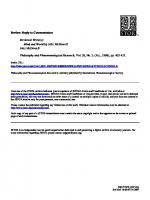
- Author / Uploaded
- Hempel Carl
Reply to David L Miller's Comments
Reply to David L. Miller's Comments Carl G. Hempel; Paul Oppenheim Philosophy of Science, Vol. 15, No. 4. (Oct., 1948),
1,161 19 121KB
Pages 4 Page size 595 x 792 pts Year 2007
Recommend Papers
File loading please wait...
Citation preview
Reply to David L. Miller's Comments Carl G. Hempel; Paul Oppenheim Philosophy of Science, Vol. 15, No. 4. (Oct., 1948), pp. 350-352. Stable URL: http://links.jstor.org/sici?sici=0031-8248%28194810%2915%3A4%3C350%3ARTDLMC%3E2.0.CO%3B2-C Philosophy of Science is currently published by The University of Chicago Press.
Your use of the JSTOR archive indicates your acceptance of JSTOR's Terms and Conditions of Use, available at http://www.jstor.org/about/terms.html. JSTOR's Terms and Conditions of Use provides, in part, that unless you have obtained prior permission, you may not download an entire issue of a journal or multiple copies of articles, and you may use content in the JSTOR archive only for your personal, non-commercial use. Please contact the publisher regarding any further use of this work. Publisher contact information may be obtained at http://www.jstor.org/journals/ucpress.html. Each copy of any part of a JSTOR transmission must contain the same copyright notice that appears on the screen or printed page of such transmission.
JSTOR is an independent not-for-profit organization dedicated to and preserving a digital archive of scholarly journals. For more information regarding JSTOR, please contact [email protected].
http://www.jstor.org Fri May 18 08:47:35 2007
CARL G. IIEMPEIA AXD P.4UL OPPENHEIM
REPLY TO DAVID L. R/IILLERIS COMMENTS CARL G. HEMPEL
AND
PAUL OPPEXHEIM
Like a number of other authors, Miller uses the term "emergent" interchangeably with "unpredictable" and employs it as a property term, i.e., in contexts of the form "Event E is emergent." As we showed in our article1, however, predictability and unpredictability as well as emergence are relations; they can be predicated of an event only relatively to some body of information. Thus, a lunar eclipse is predictable by means of information including (a) data on the locations and speeds, at some particular time, of the celestial bodies involved, and (b) the lams of celestial mechanics plus certain principles of optics; it is unpredictable on the basis of, say, (b) alone. Consequently, the phrase "Event E is unpredictable" is incomplete, and hence meaningless, in much the same sense as the expression "Straight line I is parallel." Similar observations apply to the term "emergent," which is frequently used to characterize events which, in a sense examined in detail in our article, are not explainable by a micro-structure theory. While we did not aim at avoiding whatever may be referred to by the ambiguous labels "mechanism" and "determinism," we do agree with Miller's emphasis that given experiential data never guarantee the soundness of predictions as to what is yet to come; however, we fail to see the implication that therefore we must admit that "some things are unpredictable even in principlew-all the more so since Miller does not even indicate what is to be understood by this assertion. If, in particular, it were meant in the sense of the incomplete phrase discussed in the preceding paragraph, it would have to be rejected for the reasons stated there; and if it \yere intended to assert that for some events an explanation is logically impossible, it would not only run counter to the experientialist attitude professed by Miller, but, what is decisive, it ?vould be untenable for purely logical reasons. Miller's second criticism concerns our proposal to construe a law as a sentence which is true and has certain formal characteristics; he favors the alternative of requiring high confirmation rather than truth. This would have the consequence that the term 'law' could not be used in contests of the form 'Sentence S is a law', but only in relativized contexts of the form 'Sentence S is a law relatively to experiential data D'. In support of his preference, Miller argues that, after all, empirical evidence is the basis for the formulation of any factual law. JJTe agree with him in this sense: Whether the sentence ( I ) Copper is a good conductor of electricity is n law can be determined only by reference to empirical evidence, which will make the assumption that (1) is a law more or less probable without deciding it with finality. But the fact that empirical evidence is needed to determine whether the term 'law' applies to a given statement does not entail that explicaHempel, Carl G. and Oppenheim, Paul. Studies in the logic of explanation. This journal, vol. 15 (1948), pp. 135-175.
tion of its meaning requires reference to, and thus relativization with respect to, some set of empirical data. To illustrate by an analogous case: Whether the term 'liquid' applies to a given object can be ascertained only on the basis of empirical evidence; yet it does not follow that therefore the explication of its meaning requires relativization with respect to some body of empirical evidence, and that the term should accordingly be used only in contexts of the form 'Object x is liquid relatively to empirical data D'. Thus, Miller's empiricist conception of law does not entail that laws have to be defined as satisfying the requirement of high confirmation relatively to some set of empirical data rather than the requirement of truth. As for positive reasons favoring the latter requirement, we pointed out in our article that it seems to accord better with current scientific usage. The basic reason for the requirement of truth for laws (there is no room here to develop supplementary reasons supporting it) can however be stated more explicitly. This can best be done by considering the significance of that stipulation for what we have called fundamental laws2, which constitute the simplest type of law. According to the analysis suggested in our article, the assertion (2) Statement (1) is a fundamental law means the same as (3) Statement (1) is true, and statement (1) is purely universal and contains only purely qualitative predicates. Xow, by virtue of the semantical definition of truth3, the assertion that statement (1) is true is exactly equivalent to statement (1) itself. Hence, (3) may be transformed into (4) Copper is a good conductor of electricity, and the statement (Copper is a good conductor of electricity' is purely universal and contains only purely qualitative predicates. This seems to us a perfectly reasonable interpretation, which exhibits clearly the rationale for the requirement of truth for laws: Whenever we assert a given statement to be a law, we surely mean to assert, by implication, that statement itself. But this is equivalent to asserting the truth of the given statement. Hence, ascription of the property of being a law includes ascription of truth to a sentence. But if (2) can be translated into the sentence (4), which does not contain the word 'true', why is that word used in the definition of 'fundamental law' a t all? I n paraphrasing a statement such as (2)' which characterizes some explicitly formulated sentence as a fundamental la%., the term 'true' can be completely avoided because the clause asserting the truth of the given sentence may be replaced by the simple assertion of that sentence, as illustrated by (4). Such simple avoidance of the term 'true', however, is no longer generally possible4 1.c.' p. 158. cf. Tarski, Alfred. The semantical conception of truth, and the foundations of semantics. Philosophy and phenomenological research, vol. 4 (1944), pp. 341-376. 4 On the avoidability of the concept of truth cf. Tarski, I.c., section 16. 2
3
352
DAVID L. MILLER
when the term 'law' is to be eliminated from a sentence containing variables for names of statements, such as 'If S is a fundamental law, then the denial of S is not'. This is the reason why the term 'true' could not be eliminated from our general definitions of 'fundamental law' and of 'law'/ Yale University Princeton, New Jersey









